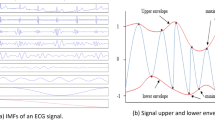Abstract
This study proposes a key generation cryptosystem based on EEG signals to strengthen security protection for blockchain transactions. For the purpose of gathering brain signals, our system includes an 8-channel custom - designed EEG device. To extract spectral power values over five distinct frequency bands, including the delta band (1–4 Hz), the theta band (4–8 Hz), the alpha band (8–13 Hz), the beta (13–36 Hz), and the gamma band (36–50 Hz), a feature extraction method named the Multitaper spectral power density estimation is performed. Reed-Solomon error correction code is employed to rectify feature set errors to compatible values. Our system utilizes two major algorithms to generate cryptographic keys: enrollment and key creation. The evaluation’s results prove the feasibility and efficiency of our EEG-based cryptographic key generation in boosting the security of blockchain transaction with the equal error rate (EER) of 0.368/0.368 (FRR/FAR).
Access this chapter
Tax calculation will be finalised at checkout
Purchases are for personal use only
Similar content being viewed by others
References
Holotiuk, F., Pisani, F., Moormann, J.: The impact of blockchain technology on business models in the payments industry (2017)
Lopez, J., Dahab, R.: An overview of elliptic curve cryptography (2000)
Babadi, B., Brown, E.N.: A review of multitaper spectral analysis. IEEE Trans. Biomed. Eng. 61(5), 1555–1564 (2014)
Wicker, S.B., Bhargava, V.K. (Eds.): Reed-Solomon Codes and Their Applications. John Wiley & Sons, Hoboken (1999)
Mai, N.D., Lee, B.G., Chung, W.Y.: Affective computing on machine learning-based emotion recognition using a self-made EEG device. Sensors 21(15), 5135 (2021)
Nguyen, D., et al.: Emotional influences on cryptographic key generation systems using EEG signals. Procedia Comput. Sci. 126, 703–712 (2018)
Author information
Authors and Affiliations
Corresponding author
Editor information
Editors and Affiliations
Rights and permissions
Copyright information
© 2023 The Author(s), under exclusive license to Springer Nature Switzerland AG
About this paper
Cite this paper
Mai, ND., Nguyen, HT., Chung, WY. (2023). EEG-Based Key Generation Cryptosystem for Strengthening Security of Blockchain Transactions. In: Zaynidinov, H., Singh, M., Tiwary, U.S., Singh, D. (eds) Intelligent Human Computer Interaction. IHCI 2022. Lecture Notes in Computer Science, vol 13741. Springer, Cham. https://doi.org/10.1007/978-3-031-27199-1_50
Download citation
DOI: https://doi.org/10.1007/978-3-031-27199-1_50
Published:
Publisher Name: Springer, Cham
Print ISBN: 978-3-031-27198-4
Online ISBN: 978-3-031-27199-1
eBook Packages: Computer ScienceComputer Science (R0)




